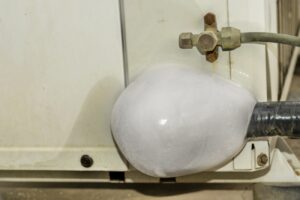Air conditioners cool down indoor environments. This is an irrefutable fact. What’s less well known, however, is how an air conditioner actually does this. It will depend on the type of system–for example, an evaporative cooler uses a much different process than a central air conditioner–but for the sake of this blog post, we’re going to make the assumption that you have a refrigerant-based air conditioner like a central air conditioner or heat pump system.
This being the case, you might, at some point, notice ice development on your air conditioner. We hope this is never the case because it’s actually bad news for the system. That’s right, an air conditioner cools, but ice is never part of the process. So then, if you do see ice forming on your air conditioner, why is it a problem? And, what causes the problem? These are questions we’re going to answer below. Read on!
What Causes Ice Formation?
As we alluded to above, refrigerant makes the cooling process possible within your central AC or heat pump system. As the blower fan pushes the warm air that is drawn from inside your home over the evaporator coil, the refrigerant within it absorbs the heat from the air, which lowers the air’s temperature, and raises the refrigerant’s temperature. During this process, condensation forms along with the coil, and then ideally drips down into a condensate pan, and drains.
If for any reason the refrigerant is unable to absorb enough heat from the air, it will stay below freezing, and instead of dripping off, the moisture that’s on your coil will freeze. The somewhat ironic part of this is that as ice forms, it hinders the evaporative coil’s ability to absorb heat even more, so even more ice will develop. Once there’s enough ice, your air conditioner won’t be able to cool the air at all.
But what causes this to happen?
There are a few potential culprits:
- A Clogged Up Air Filter: The air filter that comes standard with your HVAC systems is in place to protect those systems from debris that can get inside and damage its sensitive components. When that air filter gets too clogged up, though, it restricts airflow and therefore prevents the blower from sending enough warm air along the coil to allow the refrigerant to absorb the heat. This filter needs to be replaced every 1-3 months during periods of system use.
- Dirty Evaporator Coil: The evaporator coil of the air conditioner can collect dust and grime over time, or mold can even grow on it. It’s important that you have annual (or biannual, if it’s a heat pump) maintenance so we can address this in a timely manner for you. But even with maintenance, if enough grime builds up, it can restrict the heat absorption process.
- Refrigerant Leak: If your system is losing refrigerant, it means there is a leak that needs to be repaired. And if your system doesn’t have enough refrigerant, that means that the heat can’t be absorbed as effectively.
At Dalton Plumbing, Heating, Cooling, Electric and Fireplaces, Inc., your comfort is our promise! To set up an appointment for AC repair in Cedar Falls, give us a call at the number above, email customerservice@daltonphc.com or schedule an appointment online.

